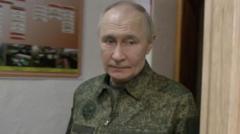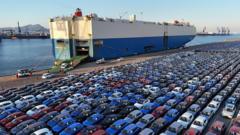In a bold move, Donald Trump has declared he "couldn't care less" about the potential rise in car prices due to the new 25% tariffs on foreign vehicles set to take effect soon. Analysts warn that these tariffs could lead to temporary shutdowns in US car production as manufacturers adjust to increased costs, but Trump remains optimistic that the changes will encourage consumers to purchase domestically made cars. Speaking to NBC News, Trump voiced his belief that foreign manufacturers raising prices would ultimately divert business back to American carmakers, affirming that "we have plenty" of American-made vehicles for consumers.
Trump's Indifference to Rising Car Prices Amid New Tariffs

Trump's Indifference to Rising Car Prices Amid New Tariffs
Ex-President dismisses consumer concerns as he enforces hefty tariffs on imported vehicles.
The former president announced on Wednesday that the tariffs would go into effect starting April 2 for cars and parts. He suggested that this could lead to increased profits for U.S. manufacturers, stating, “If you make your car in the United States, you're going to make a lot of money,” while urging corporations to relocate their operations to the U.S. in order to avoid tariffs.
Recent polls reflected public concern over the implications of these tariffs, with 72% of respondents expressing fears that costs would rise and more than half believing the administration does not prioritize decreasing prices for consumers. Trump's senior trade advisor Peter Navarro downplayed these worries, asking the public to “Trust in Trump,” and claiming that the taxes would primarily burden foreign producers.
Union Auto Workers leader Shawn Fain criticized Trump's broader economic policies but conceded that tariffs could serve as a necessary measure to reinvigorate American manufacturing jobs. While the tariffs were briefly paused due to pressure from major auto manufacturers, Trump reiterated his unwillingness to delay their implementation any longer unless substantial negotiations yielded favorable outcomes.
In addition to the automotive tariffs, Trump hinted at potential secondary tariffs on Russian oil if peace talks regarding Ukraine fail to progress. This threat suggests a tougher stance on trade relations, which could further strain ties with several key trading partners that have already voiced intent to retaliate against the U.S.
As the UK pushes to negotiate exemptions from impending tariffs, other nations like Germany and France are preparing to respond firmly against these measures, highlighting the potential for escalating international trade tensions.
Recent polls reflected public concern over the implications of these tariffs, with 72% of respondents expressing fears that costs would rise and more than half believing the administration does not prioritize decreasing prices for consumers. Trump's senior trade advisor Peter Navarro downplayed these worries, asking the public to “Trust in Trump,” and claiming that the taxes would primarily burden foreign producers.
Union Auto Workers leader Shawn Fain criticized Trump's broader economic policies but conceded that tariffs could serve as a necessary measure to reinvigorate American manufacturing jobs. While the tariffs were briefly paused due to pressure from major auto manufacturers, Trump reiterated his unwillingness to delay their implementation any longer unless substantial negotiations yielded favorable outcomes.
In addition to the automotive tariffs, Trump hinted at potential secondary tariffs on Russian oil if peace talks regarding Ukraine fail to progress. This threat suggests a tougher stance on trade relations, which could further strain ties with several key trading partners that have already voiced intent to retaliate against the U.S.
As the UK pushes to negotiate exemptions from impending tariffs, other nations like Germany and France are preparing to respond firmly against these measures, highlighting the potential for escalating international trade tensions.





















